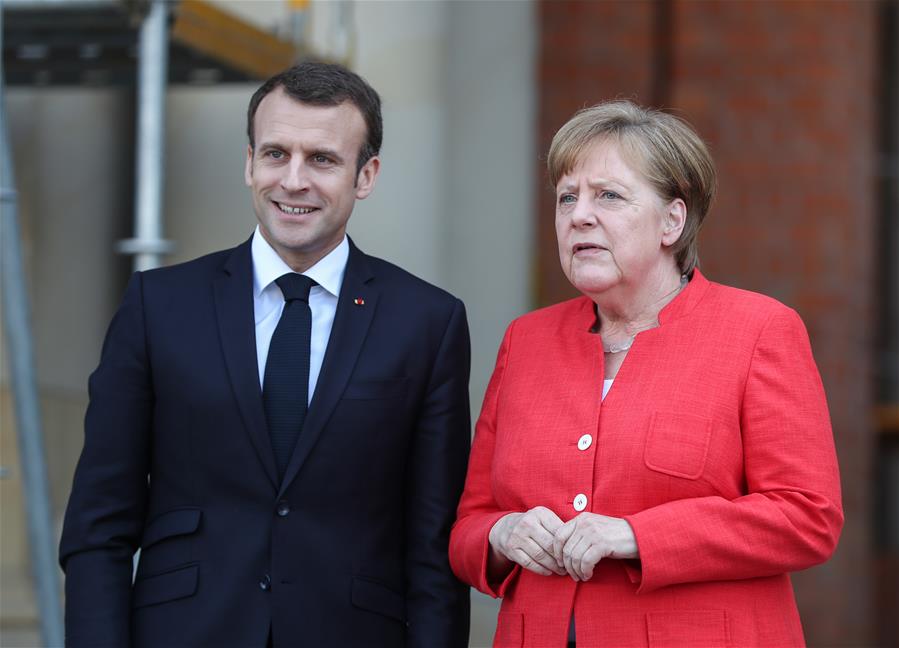
German Chancellor Angela Merkel (R) and visitng French President Emmanuel Macron pose for photos at Berlin Palace in Berlin, capital of Germany, on April 19, 2018. (Xinhua/Shan Yuqi)
BERLIN, April 19 (Xinhua) -- German Chancellor Angela Merkel and the visiting French President Emmanuel Macron agreed on Thursday to take key decisions to reform the Eurozone by June.
"We need an open debate and at the end the ability to compromise," Merkel said at a press conference after the meeting with Macron, before promising that an agreement would be reached by the summer.
She also warned that Europe could only represent its interests internationally as one. The pair also need to prepare European policies on asylum and immigration.
Macron said at the press conference that he wanted to present a united front on reform of the Eurozone by June, adding that France and Germany both wanted to come up with how to improve the single currency zone by the beginning of the summer.
Macron's vision includes turning Europe's existing bailout fund into a European Monetary Fund (EMF), and a Eurozone finance minister, which is difficult for Merkel as the German Chancellor was under pressure from her conservative bloc not to agree to reforms leading to more German funding.
After initially expressing support for a series of ambitious policy proposals first made by Macron back in September 2017, Berlin has recently begun to backtrack on key elements such as a European Monetary Fund, shared Eurozone budget and deposit insurance scheme seen as necessary for the completion of European Economic and Monetary Union (EMU) by many experts.
Pushing back against skeptical voices within the CDU and Christian Social Union (CSU), Merkel has reiterated her support for a so-called banking union, including a uniform deposit insurance scheme. The chancellor insisted that Germany would not act as a barrier to change, expressing confidence that a "strong reform package" could still be assembled prior to a looming EU summit in June.
Whether Merkel can really deliver on this promise and thus preserve her cordial relationship with Macron remains to be seen. Large swaths of the allied CDU/CSU parties vehemently oppose the creation of a Eurozone budget, for example, demanding that an annual shortfall of around 13 billion euros (16.1 billion U.S. dollars) in the overall EU budget caused by the departure of the United Kingdom be treated as an issue of greater urgency.
Additionally, the CDU/CSU has expressed concerns that the transformation of the European Stability Mechanism (ESM) into a permanent European Monetary Fund could further weaken the sovereignty of member states although the idea was originally mooted by the ultra-orthodox German ex-finance minister and CDU politician Wolfgang Schaeuble.
At the same time, however, there are several areas of potential reform where views adopted by Berlin and Paris have so far been closely aligned. Both countries are keen to expand the European Common Asylum System, as well as making elements thereof which already exists on paper more effective in practice.
A suggestion by Macron to grant municipal governments EU aid in exchange for settling refugees was welcomed by Merkel and corresponds with her own desire to ensure more burden sharing across the bloc in the future.
Furthermore, Germany and France are largely on the same page with regards to promoting closer European defense cooperation. Macron's publicly-circulated idea to develop a joint military doctrine and endow EU defense projects with a special budget echo the German chancellor's widely-publicized warnings that Europe can no longer rely on Washington to guarantee its physical security in an increasingly multipolar and unreliable world.
Lastly, the Franco-German axis is well and alive in ongoing efforts to craft a new taxation system for the digital economy which creates a more level competitive playing field. Macron has called for a binding minimum corporate taxation rate in the EU towards this end, while the new German government has enshrined its support for a "fair taxation of large corporations like Google, Apple, Facebook and Amazon" in its coalition agreement as a means to prevent a race to the bottom among EU member states.















